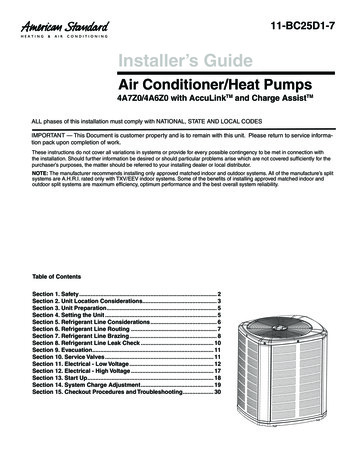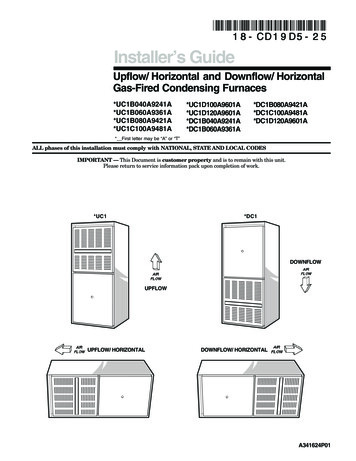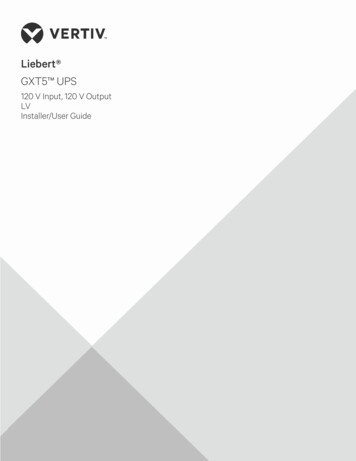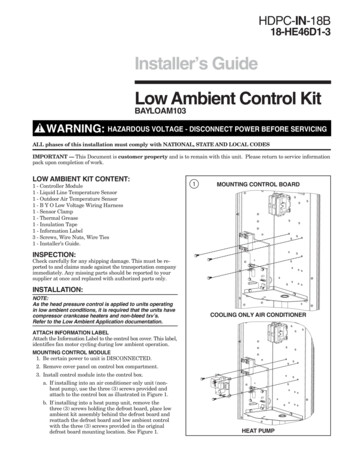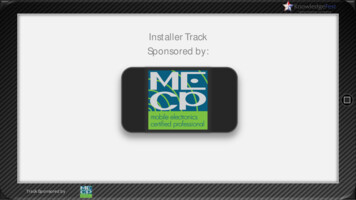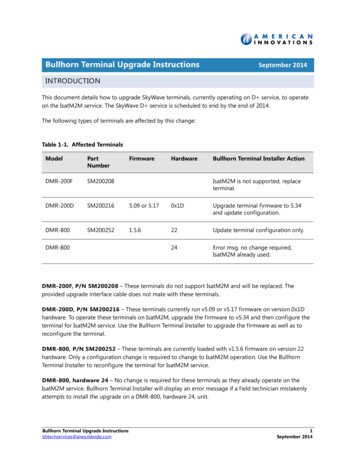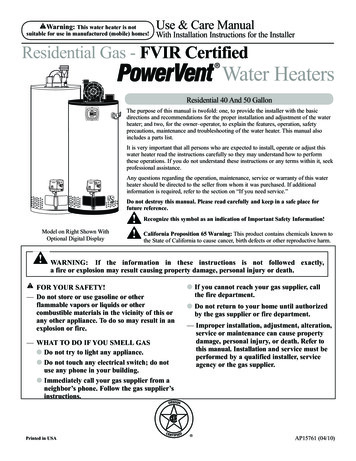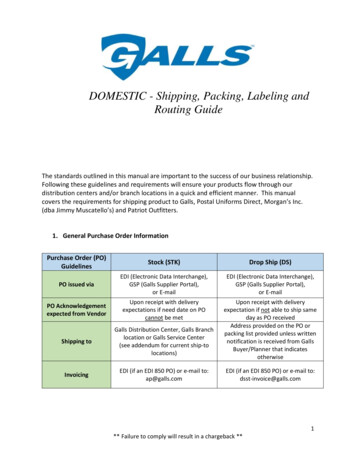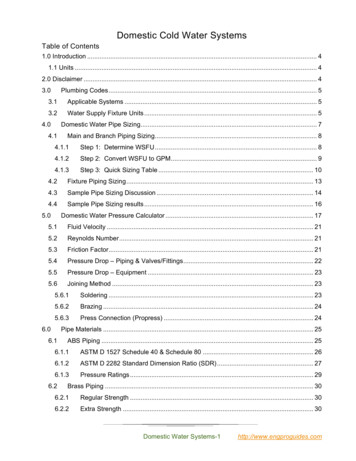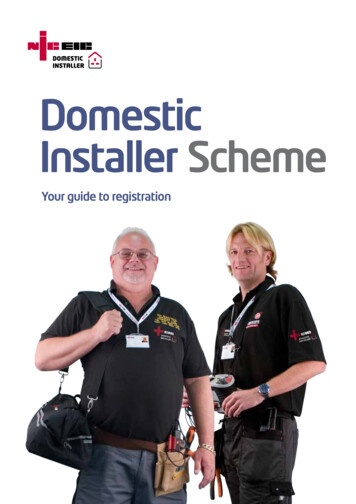
Transcription
DomesticInstaller SchemeYour guide to registration
2 Domestic Installer SchemeWelcome. Thank youfor applying to becomepart of NICEIC.Purpose ofthis guideNICEIC is the UK’s leading voluntary regulatory bodyfor the electrical contracting industry. We have beenassessing the competence of electrical contractors forover fifty years and currently maintain a register of morethan 25,000 contractors.Choosing to become NICEIC registered sets your businessapart. Our electrical contractors are assessed on a regularbasis to ensure high standards.There are many benefits to becoming an NICEIC registeredcontractor, more of which can be found inside, andin addition to the services we provide, we promise towork hard at promoting your business to consumers,householders and specifiers of electrical work.We look forward to working with you and your business.Yours SincerelyEmma Clancy, Chief Executive Officer, NICEICThis guide is designed to help you through theregistration process for the NICEIC DomesticInstaller Scheme. It covers the process step bystep, including sections on how to complete yourapplication for registration, how to prepare foryour assessment, and what happens once youare registered. Also included in this guide are therequirements for your business, and the addedvalue services that NICEIC can offer you.Registration is straightforward but if at any pointyou need some advice or assistance just contactour friendly team on 0870 013 0458 (Option 1)who will be happy to help.
Domestic Installer Scheme 3iWhat is the DomesticInstaller Scheme?NICEIC’s Domestic Installer Scheme enablesyou to cost effectively notify applicable workin accordance with Part P of the BuildingRegulations. We are an authorised Part Pcompetent persons scheme provider forcontractors working on electrical installationsin domestic properties. This guide explains theregistration process, qualification requirementsand the assessment process.Howto applyContentsCall usBenefits of joining NICEIC 4The registration process 5Registration requirements checklist 6Step by step guide to registration 7How to prepare foryour assessment 10Role of the Qualified Supervisor 12Suitable qualifications fora Qualified Supervisor 13Summary of visit 15After you are registered 160870 013 0458(Option 1)Email usjoin@niceic.comWebsitewww.niceic.comWhitting Valley RoadOld WhittingtonChesterfieldDerbyshireS41 9EY
4 Domestic Installer SchemeBenefits ofjoining NICEICOur aim is to provide the wholepackage to our customers byoffering many added valueservices to make your lives easier.Registering with NICEIC will giveyou access to the following: Tools to build your businessTools for your trade A Quality Mark to prove to your clients that your businessworks to industry standards All customers of NICEIC registered contractors will becovered by the NICEIC Platinum Promise outlined below A listing on www.niceic.com NICEIC logos for your company vehicles, stationeryand website to promote your business NICEIC photo ID cards and personalised businessstationery available to purchase Opportunity to become registered with Trustmark,the Government backed initiative to help consumersfind competent, honest tradespeople– www.trustmark.org.uk Access to free commercial and legal advice 24 hoursa day, seven days a week, from DAS Business Law Exclusive access to NICEIC Online Certification – asimple, streamlined and cost-effective way to certify andnotify work. Take a look at www.niceiconline.com Competitive prices for training, insurance and industryleading publications and DVDs Workwear, tools, test equipment and much moreavailable from NICEIC Direct – www.niceicdirect.com Free subscription to Connections – an informativequarterly magazine Platinum PromiseTechnical support Priority access to the NICEIC Technical Helpline –electrical engineers with years of experience in theindustry who can help resolve any technical queriesyou may have Free pocket guides – handy technical reference cardsto carry with you on-site Technical seminar events including TechTalks andNICEIC LiveAll customers of NICEIC registered contractors will be coveredby the NICEIC Platinum Promise. Our Platinum Promiseprovides assurance to your customers that any work that hasnot has not been carried out in compliance with the buildingregulations will be rectified. The Platinum Promise lasts forsix years from the date of work completion and coversup to a limit of 25,000 for any one installation. It providesconsumers with extra peace of mind and gives NICEICregistered contractors a competitive edge over others.
Domestic Installer Scheme 5The registration processCall us on 0870 013 0458 to apply, orreturn your completed application formalong with the application fee which canbe paid in one of two ways:StagedpaymentOption 2: Staged payment – 50% of thefee paid on application with the remaining50% paid by direct debit over the followingthree monthsFull paymentOption 1: Payment of the full balance onapplication via credit card, cheque, directdebit or BACS transferPlease complete and return yoursigned payment declaration and directdebit mandateWe will send you a welcome pack to help youprepare for your assessmentWe will contact you proposing a date foryour assessment visitA further assessment is arrangedAdditionalassessmentneededYour assessment will be carried out by alocal AssessorYour Assessor will complete an assessmentreport during the visit, recommending that youare accepted or detailing further action requiredbefore the registration process is completedCongratulations! You are now registered andcan take advantage of all of the benefits of beingan NICEIC Domestic Installer and start notifyingyour jobs via www.niceiconline.comYou will receive your Registration Pack andCertificate of RegistrationFurther actionrequiredYou will be notified of any areas thatneed to be addressed before yourregistration can be completed. In somecases this will be achieved by providingdocumentary evidence, such as when atechnical reference document needs to bepurchased. In some cases you will need afurther assessment, if the matter is relatingto the technical standard of workDocumentaryevidenceneededOnce the areas outlined have beenaddressed, you will need to providedocumentary evidence
6 Domestic Installer SchemeRegistration requirementschecklistListed below is a summary of the registration requirementsfor the Domestic Installer Scheme. This guide will explain therequirements in more detail and contains useful advice on howyou can ensure you are fully prepared for your assessment.To be eligible for registration with NICEIC,your business must: Be directly engaged in Domestic Electrical Work ave premises and equipment appropriate to theHrange and scale of electrical work you undertake,including test instruments suitable for carrying outthe range of tests required by BS 7671 aintain a record of the ongoing accuracy andMconsistency of test equipment used for certificationand reporting purposes Have at least 2 million Public Liability Insurance old current editions of BS 7671 and other technicalHreference documents relevant to the range and scaleof electrical work you undertake Be or employ competent persons to undertakeelectrical work who are appropriately supervised Maintain a record of complaints made about thetechnical standard of electrical work carried out byyour business, together with details of the remedialaction taken Appoint one or more Qualified Supervisors as required Have a written Health and Safety Policy Statement andcarry out risk assessments as appropriate Submit an application for each address from whichelectrical installation work is arranged or carried out Make available for assessment sufficient examples ofdomestic electrical installation work completed withappropriate certification in the previous 12 monthsby the business applying for registration. The workmust be within 30 minutes traveling distance of yourtrading address, be representative of the day to dayactivities of the business and comply with BS 7671and relevant codes of practice. It also needs to besubstantial enough to allow the assessor to makean objective assessment of the competence ofyour Qualified Supervisor(s) and that an adequatesupervisory system is in place. In addition, it mustbe able to be de-energised and isolated at the timeof the assessment to allow dead tests to be safelydemonstrated.It is advisable to arrange access to a selection of siteswhere you have undertaken work applicable to thescheme, albeit all sites may not be visited/inspectedon the day of your assessment. For your initialapplication completed work on your own premisesmay be acceptable, but for on-going registration, workon your own premises will not be accepted.
Domestic Installer Scheme 7Step by step guideto registrationStep 1Application Scheme transfersTo transfer from another scheme provider call us on0870 013 0458, we will need the following information: Written confirmation ofyour request to transfer Evidence of yourcurrent registration,including expiry date Evidence of 2mPublic Liabilityinsurance coverOnce received, we willreview this informationbefore contacting youto confirm if your transferhas been successfulor if there are anyoutstanding items. A copy of your lastassessment report The date of youroriginal assessment Evidence of yourtraining qualifications(copies of certificates)There are several different ways for you to apply to registerwith NICEIC:The scopes of registration are: Call our team on 0870 013 0458. We will take all of yourdetails over the phone and get your application startedThe scope of work covers the full range of domesticelectrical installation work. This is appropriate for thosebusinesses that carry out electrical installation work asthe main part of their business. All businesses wishing tobe registered as full scope must supply examples of workincluding: Complete an application form and return to oursales team along with a cheque to cover the initialapplication fee (if applicable)Please note when completing your application:A separate application must be made for each addressfrom which electrical work is arranged or carried out.Subsequent annual fees are charged from the date youapply for the Domestic Installer Scheme, not from the dateyou are successfully registered onto the scheme.Full Scope Complete rewire Installation of a new, or replacement of an existing,consumer unit New CircuitDefined ScopeWays to pay:The scope of work is limited to electrical installationwork in connection with, or ancillary to, some othernon-electrical work.Option 1: P ayment of the full balance on applicationvia credit card, cheque, direct debit orBACS transferExamples of work/installations that fall within the scopeof Defined Scope:Option 2: Staged payment: Plumbing ConservatoriesChoose from our two different payment options:50% of fee paid on application with the remaining 50%paid over the following three monthsFull Scope or Defined Scope?The Domestic Installer Scheme has been approvedto register installers to Full Scope or Defined Scope fordomestic electrical installation work in accordance withPart P of the Building Regulations. Kitchen, bathroomand bedroom CCTV Security systems Extractor fans Gas heating Garden installations Loft conversions Maintenance Telecommunications Air conditioning Oil-fired heating Swimming pools Extensions Stair lifts Door/gate entry Spa baths Solid fuel heating
8 Domestic Installer SchemeStep by step guideto registrationStep 2The assessmentYour assessment will usually last for a half day and willinvolve a visit to inspect a representative sample of yourelectrical work, consistent with the range and scope thatyour business undertakes.The assessment is your opportunity to show that thework you do complies with the Rules for Registrationof Domestic Installers, and the IET Wiring RegulationsBS 7671. It is also a great opportunity for you to meetone of our highly skilled assessors and ask any questionsyou might have about how NICEIC can help you achieveyour business goals.Your Assessor will begin the assessment at your businesspremises where the proposed Qualified Supervisor willneed to be present. At this point your Assessor will needto establish that your business has premises, tools andmaterials appropriate to the range and scale of workundertaken, all details of which can be found in the ‘Howto prepare for your assessment’ section of this guide.The next stage of the assessment involves inspection ofsamples of electrical work undertaken by your business,to see how you have been interpreting and applying therequirements of BS 7671 and other related Codes ofPractice and British Standards. The proposed QualifiedSupervisor needs to be present at this point, and they willneed to make adequate arrangements for access to theelectrical work at any site or premises selected prior to yourassessment visit.The electrical supply at any site assessment will have tobe switched off. The inspection will normally start with theconsumer unit, and will include a check of the earthingand bonding arrangements. The assessor will continueby carrying out sample checks of other parts of theelectrical installation.The Qualified Supervisor will need to demonstratecompetence in inspection and testing, including use ofinstruments, interpretation of results and completionof certification.
Domestic Installer Scheme 9Step 3Outcome of assessment Once your assessment has finished, your Assessor willmake one of the following recommendations. The reportwill then be internally verified and a letter will be sent to youconfirming your assessment outcome.AcceptanceFollowing your successful assessment, we will send you aregistration pack containing your certificate, a van sticker andinformation on how you should notify your work. You will alsobe given the log in details for the secure area of our websitewhere you can access unrivalled technical information.Further actionIn some cases a business may not satisfy all Rules forRegistration during the assessment, but the Assessorwill talk you through what action you will need to take toprogress your application. This is likely to be either:Providing documentary evidence – you will need toconfirm that you have addressed all matters that yourAssessor has detailed in the Assessment Report, suchas obtaining a technical reference document (BS 7671,Approved Document P, Electricity at Work Regulations,etc.) before your registration can be completed. This canbe done by posting or emailing documentary evidence toour Head Office.An additional assessment – a further assessment will berequired if the matter relates to the technical standard ofthe electrical work or the responsibilities of the proposedQualified Supervisor. In this instance the Assessor will wishto see further examples of electrical work which will incuran additional fee. Your Assessor will be able to support youthrough this process to ensure you have everything in placefor this additional assessment.
10 Domestic Installer SchemeHow to prepare foryour assessment To ensure you are fully prepared for yourassessment, please have the following in place:Premises and equipmentYour Assessor will visit you at your business premises andwill need to ensure that you have the necessary tools andmaterials appropriate to the range and scale of electricalinstallation work that your company carries out.Your company letterhead will also need to be checked, aswill your Health and Safety Policy, risk assessment and safeisolation procedures. Guidance from the HSE on healthand safety policies and risk assessments is available todownload from www.niceic.comTechnical reference documentsYour Assessor will need to review the technical referencedocuments that your business owns, to ensure thatthey are appropriate to the range and scale of work youundertake. As a minimum, you must have access to theLATEST edition of each of the following documents:Test instruments and leadsYour business must have an adequate number ofserviceable test instruments and test leads appropriate tothe range and scale of electrical work that you undertake.This equipment needs to be made available to yourAssessor during your assessment and used during theonsite inspection by the proposed Qualified Supervisor.As a minimum, the business will need to have one ormore instruments that can test the following: Voltage Insulation Resistance Continuity Earth FaultLoop Impedance Residual Current DevicesThe assessor will also need to review your record ofongoing accuracy and consistency of the test equipmentused for certification and reporting purposes. An examplecan be downloaded from www.niceic.com BS 7671 – Requirements for Electrical Installations(IET Wiring Regulations)Suitable (GS38) leads will be need to be available for theabove relevant test instruments. Memorandum of Guidance on the Electricity at WorkRegulations 1989. This document is available as a freedownload from the HSE website www.hse.gov.ukInstallation certificates issued to clients B oth of these documents are availableto buy from www.niceicdirect.comIn order to demonstrate how you have complied withBS 7671 your Assessor will need to review the followingcertificates and reports during your assessment: Approved Document Part P, available to download forfree at www.planningportal.gov.uk A sample of electrical installation certificates issuedduring the previous 12 monthsSites for Assessment If appropriate, certificates for fire alarm or other similarelectrical work undertaken by the business in the previous12 monthsIn advance of your assessment you will need to gainadequate access to sufficient representative samples ofdomestic electrical work completed by the business. Thework should comply with BS 7671 and relevant codes ofpractice, and must have been undertaken in the previous12 months and within 30 minutes travelling distance ofeach other and the business’ office.Don’t forget, the work needs to be substantial enough toallow the assessor to make an objective assessment ofyour competence and some of the work presented forassessment must be certified and energised. Evidence that you have complied with therequirements of the Building Regulations whennotifying installation workTraining qualificationsYour Assessor will need to check the proposedQualified Supervisor’s qualifications and trainingcertificates during the assessment so please ensurethat these are available. Please check page 13,‘Suitable qualifications’, for further information.
Domestic Installer Scheme 11Public Liability InsuranceYour Assessor will need to see a copy of your business’Public Liability Insurance during the assessment. Theinsurance must cover the range of work that youundertake and be a minimum of 2 million. Please note,it is Public Liability Insurance that needs to be checkedand Employers Liability to a minimum of 10 million if alsoapplying for TrustMark.NICEIC Insurance Services are able to offer contractorshighly competitive rates on Insurance.For more information call 0845 601 2376 or visitwww.niceicinsurance.comRecord of complaintsEvery business is required to keep a log of any complaintsmade about the technical standard of electrical work theyhave installed, along with the remedial action taken.This log will need to be made available to your Assessorat each periodic assessment. An example can bedownloaded from www.niceic.comNotifying workDomestic Installers undertaking electrical installationwork in dwellings are required by Part P of the BuildingRegulations to notify relevant work to local authority buildingcontrol. Details of the notifiable work need to be providedto NICEIC within 25 days of completion of the work.Once successfully registered, our simple online notificationservice, www.niceiconline.com, will allow you to easilysubmit these details. We will then notify building control andsend your customer a Building Regulations ComplianceCertificate on your behalf, confirming that the workcomplies with the relevant Building Regulations.Assessment CancellationIf you cancel your planned assessment visit you may becharged a proportion of the associated costs. Businessesthat cancel or decline planned visits on more than twooccasions may have their applications/registrationscancelled and will need to reapply.
12 Domestic Installer SchemeRole of theQualified Supervisor A Qualified Supervisor is an electrically competent person withspecific responsibility for the safety, technical standard andquality of electrical installation work under their supervision.A Qualified Supervisor is responsible for:A proposed Qualified Supervisor will: Ensuring that the results of inspection and testing areacceptable and recorded correctly on the appropriatecertificates Be directly employed by the business on a full-time basis Ensuring that the business’ premises, equipment,documentation and records are available for inspectionwhen required by NICEIC Safeguarding all unused NICEIC forms of certificationand reporting any loss, theft or misuse Satisfy the technical training and/or experiencerequirements as detailed on page 13, ‘Suitablequalifications’ Understand the Electricity at Work Regulations, currentedition of BS 7671, and the Codes of Practice andguidance documents relevant to the range of electricalwork undertaken Understand the inspection, testing, verification,certification and reporting procedures for the rangeof electrical work undertaken
Domestic Installer Scheme 13Suitable qualificationsfor a Qualified SupervisorYour Assessor will need to check qualifications during theassessment visit, so please ensure you have your originalcertificates available.From 6th April 2013 the technical competencerequirements changed for proposed Qualified Supervisors.From this date there are now five different routes satisfyingthe requirements for a proposed Qualified Supervisor,including on-site assessment, off-site assessment, a mixtureof both and the gaining of appropriate qualifications.The routes allow flexibility for individuals who hold olderqualifications or have been a Qualified Supervisor withinthe past two years, assessed by NICEIC, as well asallowing a route for individuals who can provide auditableevidence of their knowledge and experience of undertakingelectrical work.For compliance with Building Regulations in Scotland,we have the NICEIC Certifier of Construction Scheme.To see which route is mostappropriate for you please take alook at the flow diagram overleaf. If you have any questions regardingtraining qualifications or any otherpart of the registration process simplycontact us on 0870 013 0458 and wewill be happy to help.Tel:0870 013 0458Email: traininginfo@niceic.comWeb: www.niceic.com
14 Domestic Installer SchemeSuitable qualifications fora Qualified SupervisorYesDo you hold a Level 3 Certificate in Installing, Testing and Ensuring Complianceof Electrical Installation Work in Dwellings?Please provide evidence of work carried out thatdemonstrates your competence for the scope forwhich you have appliedNoDo you hold an NVQ3 Electrotechnical Services (Installation, Buildingsand Structures)?PLUSLevel 3 Award in the Initial Verification andCertification of Electrical InstallationsORLevel 3 Award in Approving Electrical Workin Dwellings in Compliance with BuildingRegulationsANDCurrent Level 3 Award in the Requirementsfor Electrical Installations (17th Edition)?YesPlease provide evidence of work carried out thatdemonstrates your competence for the scope forwhich you have appliedNoDo you have any relevant electrical installation qualification that precedes NVQ?PLUSLevel 3 Award in the Initial Verificationand Certification of Electrical InstallationsORLevel 3 Award in Approving ElectricalWork in Dwellings in Compliance withBuilding RegulationsANDCurrent Level 3 Award in the Requirementsfor Electrical Installations (17th Edition)?YesPlease provide evidence of work carried out thatdemonstrates your competence for the scope forwhich you have appliedANDEvidence of on-going Continuous ProfessionalDevelopment (CPD)NoDo you have auditable evidence (eg: certificates of competence) that reflect thelearning outcomes identified in the Level 3 Certificate in Installing, Testing andEnsuring Compliance of Electrical Installation Work in Dwellings, based on theNational Occupational Standards (NOS)?NoAre you an existing or previously recognised Qualified Supervisor registeredwithin the last 2 years and hold the current Level 3 Award in the Requirementsfor Electrical Installations (17th Edition)?If you hold a 17th edition qualification but do not hold a craftqualification then you will need to complete the Certsure KnowledgeAssessment or obtain the relevant industry standard qualificationsYesYesPlease provide evidence of work carried out thatdemonstrates your competence for the scope forwhich you have appliedPlease provide a letter or similar from yourprevious scheme provider confirming yourQualified Supervisor statusANDProvide evidence of work carried out thatdemonstrates practical competence for thescope for which you have applied
Domestic Installer Scheme 15Domestic Installer Assessment– summary of visitThe information below outlines what happens on the dayof your assessment. Timings are approximate and aregiven as an indication of the format of the assessment. Introduction of Assessor and opening meeting with theQualified Supervisor(s) (QS) at your company address.10 minutes. Review of scheme criteria (qualifications, insurance,publications & technical references held, companyletterhead, complaints log, Health and Safety PolicyStatement, risk assessments, safe isolation procedures,test equipment calibration etc). 30 minutes Review of randomly selected electrical certificatesand reports. 10 minutes Site assessment; of electrical work undertaken by yourbusiness, to see how you have been interpreting andapplying the requirements of BS 7671 and other relatedCodes of Practice and British Standards. The QS willneed to demonstrate competence in inspection andtesting, including use of their instruments, interpretation ofresults & completion of certification. 2 ½ hoursA minimum of one site is required, selected by the Assessorat the opening meeting - it is advisable for a selection ofsites to be made available.Note: Any site should be within 30 minutes of youroffice address. Please call the office in advance of theassessment if the sites do not meet this requirement. Closing meeting conducted with the Qualified Supervisor.10 minutes
After you are registeredAs a Domestic Installer you must demonstratethat you are continuing to comply with the Rulesfor Registration and that technical standards arebeing maintained.We ensure this by undertaking a periodicassessment with you on a regular basis, normallyevery year.For your initial application completed work on yourown premises may be acceptable, however foron-going registration, work on your own premiseswill not be accepted for your assessment visit.Useful contactinformation:Customer Service0870 013 0382customerservice@niceic.comTechnical Helpline0870 013 0391technicalhelpline@niceic.comTraining0870 013 0389traininginfo@niceic.comBuilding Compliance0870 013 0462enquiries@niceic.comNICEICPart of Certsure LLPWarwick HouseHoughton Hall ParkHoughton RegisDunstable LU5 5ZXOur annual fee includes the provision for a half dayperiodic assessment visit, if however, the natureof your business is such that additional time forassessment is required, an additional fee will becharged. Your Assessor will discuss this with youduring your initial assessment.We look forward to welcoming you to NICEIC!
domestic electrical installation work in accordance with Part P of the Building Regulations. The scopes of registration are: Full Scope The scope of work covers the full range of domestic electrical installation work. This is appropriate for those businesses that carry out electrical insta

